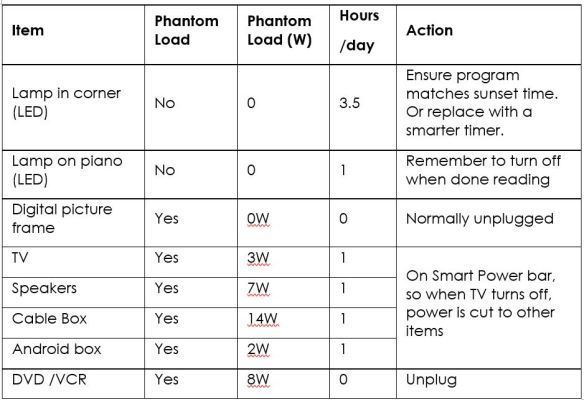It’s time for step three of our home auditing. But first, how did your draft audit go? At our house, we had to replace the sweep on the side door. The sweep is the weather stripping at the bottom of the door.
In this issue, let’s look at electricity use in our houses. Our goal will be to find out how many electrical devices we have and how many of them have phantom load. Then we’ll work on reducing.
To start, get a pencil and paper and make a list of everything you have that plugs in. (For now, we’ll skip things that are wired-in like ceiling lights, and furnace fans). Then, note beside each item if you think it might have a phantom load. (Phantom load is the power something uses when it’s turned off. Things that have a light, clock, program, or are Wi-Fi connected, or are instant-on, will have a phantom load.)
Once you have that list, try to estimate how many hours/day you use it. For example, one light in our living room is on from when the living room starts to get dark until 10pm. In the winter, that is five hours but in summer it’s about two. So, on average, it would be three and a half hours/day. We watch more TV on the weekend but almost none throughout the week, so we average about one
hour/day. The chart for our living room is below.
If you want to take it a step further, you can use a Watt meter (also called a Power or Energy meter) to measure the phantom load and the energy consumed when something is running. SES has a couple of Watt meters we can loan out, as does Saskatoon Light and Power. Contact me if you want to get your hands on one.
Now, the important part. What have you found out and what will you do about it?
Phantom load can be up to 1/10th of the energy consumed in our homes. I read an article recently about someone who discovered that his TV, with all its attachments, was using 7% of his household electricity. You can use a power bar, or a smart or timed power bar to cut off the phantom load.
Should some electrical items be replaced with more efficient versions? If there are things on your list that you never, or rarely use, maybe you could unplug them to get rid of the phantom load. Maybe you could give some of them away to get rid of the clutter.
If you learn something you want to share, or if you have questions, you can always contact me at angieb@environmentalsociety.ca. I’d love to hear about your successes and challenges.


Angie Bugg manages energy conservation projects for the Saskatchewan Environmental Society, and is an active member of McClure United Church. You can contact her at angieb@environmentalsociety.ca “The earth is the Lord’s and all that is in it, the world, and those who live in it.” (Psalm 24:1)
 Welcome to the Local Global Advocacy Network information site. This site is the gathering spot for the many aspects of the justice work of the Saskatchewan Conference of the United Church of Canada.
Welcome to the Local Global Advocacy Network information site. This site is the gathering spot for the many aspects of the justice work of the Saskatchewan Conference of the United Church of Canada.





